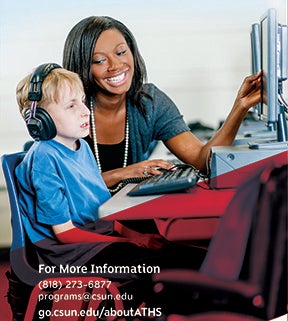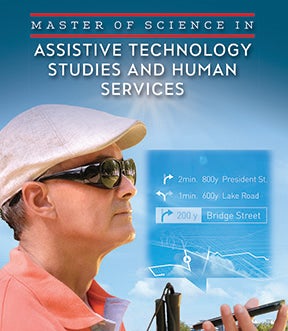 With more than 4,000 developing technologies that enable persons with disabilities to live more productive, independent and fulfilling lives, the academic discipline of Assistive Technology Studies and Human Services (ATHS, offered by HHD through Tseng College) helps meet the demand for Assistive Technology (AT) specialists, providing them with a variety of skills and knowledge to ensure that AT users are able to access and benefit fully from advances in the field.
With more than 4,000 developing technologies that enable persons with disabilities to live more productive, independent and fulfilling lives, the academic discipline of Assistive Technology Studies and Human Services (ATHS, offered by HHD through Tseng College) helps meet the demand for Assistive Technology (AT) specialists, providing them with a variety of skills and knowledge to ensure that AT users are able to access and benefit fully from advances in the field.
Physical disabilities affect every sector of the population - school-age children, young adults, seniors, veterans and more. In addition, because lifespans are lengthening, and disability often accompanies increasing age, the U.S. Department of Labor predicts substantial long-term growth in all health-service sectors, including the areas of assistive, adaptive and access technologies.
Information about the field:
Assistive technology is used to improve the functional capabilities of individuals with disabilities. Assistive technologists perform a variety of tasks, including evaluating proper assistive, adaptive, habilitative and rehabilitative devices for people with disabilities. Assistive technology provides equity to its users and provides individuals with access to the community and the world. The assistive technology workforce is spread among many fields, including the fields of education, healthcare, human resources, and product design. This degree utilizes a multidisciplinary approach to graduate-level studies in assistive technology.
Information about the program:
The Master of Science in ATHS is a program that interweaves biological, design, and human services concerns relevant to assistive technology. It focuses on universal accessibility and the human device interaction across cultural and generational settings. The Professionals who interact with individuals using assistive technology in settings such as the work place, health care, and education have need for graduate level education regarding the ramifications of human device interactions, and their use across generations and in a multicultural context. This Master of Science Degree provides the preparation for Human Services Professionals who desire additional education in assistive technology assessment, outcome measurements, service delivery systems, standards of practice, tools and device funding. Additionally, graduates receive graduate level training in assistive technology counseling, as well as content related to ethical, legal, policy, cultural, historical, and advocacy issues, while becoming more familiar with human device interactions and the product design process. The enhancement of the graduates’ knowledge of common etiologies and pathologies associated with physical, communication and cognitive disabilities will allow a greater understanding of the need for specific assistive technologies. Coupled with a multicultural, multigenerational approach, the program prepares graduates to thoughtfully apply assistive technology in a variety of environments.
 In this rapidly growing field, the experiences with evidence-based practice inherent in a graduate program allow practitioners to develop research-based strategies to better provide individuals with the tools to access their communities. Our program is designed for mid-career professionals with a goal of preparing them for higher level positions within the field of Assistive Technology. This degree is offered through the College of Health and Human Development and is not housed in a specific department. This online MS program uses a combination of asynchronous and synchronous delivery modes. The ATHS MS program is administered by the Tseng College of Extended Learning, which fosters cohort-based online learning communities with exceptional student support services. This online program includes exceptional faculty with varied experiences in the field of Assistive Technology.
In this rapidly growing field, the experiences with evidence-based practice inherent in a graduate program allow practitioners to develop research-based strategies to better provide individuals with the tools to access their communities. Our program is designed for mid-career professionals with a goal of preparing them for higher level positions within the field of Assistive Technology. This degree is offered through the College of Health and Human Development and is not housed in a specific department. This online MS program uses a combination of asynchronous and synchronous delivery modes. The ATHS MS program is administered by the Tseng College of Extended Learning, which fosters cohort-based online learning communities with exceptional student support services. This online program includes exceptional faculty with varied experiences in the field of Assistive Technology.
Our students:
The program is designed for a broad range of human services professionals, including physical therapists, occupational therapists, speech and language pathologists, counselors and human resources experts who need training in the field of assistive technology. Our alumni work in a variety of human services, government, non-profit and educational environments.
Students in the program have diverse and varied career backgrounds, but find coherence in their interests in universal design and assistive technology. Of note, of the students who have enrolled in the program, we have had Assistive Technology professionals, Special Education Teachers, Occupational Therapists, Speech/Language Pathologists, and Speech/Language Aides. In addition, there have been individuals employed in disability advocacy/services, behavior intervention, respite care, and engineering, as well as in other, unrelated fields. The heterogeneity of the cohort provides exposure to a variety of different perspectives on Assistive Technology. Students are attracted to the program as they have a desire to enhance their ability to help individuals in need of assistive technology.
Our faculty:
This program draws on the expertise of faculty and staff both within CSUN and outside of CSUN, including leaders in the field. The adjunct faculty who teach in this program are dedicated to improving educational opportunities in the field of Assistive Technology. They are passionate about their courses and committed to the ongoing success of the program. Our adjunct faculty are engaged and make significant contributions to those decisions that move the program forward.
Why CSUN?
CSUN’s Center on Disabilities (COD) is internationally known, both for hosting the world’s largest Assistive Technology Conference and for its well respected ATACP (Assistive Technology Applications Certificate Program) program for assistive technology programs. In 2007, faculty from the Colleges of Health and Human Development (HHD) and Engineering and Computer Science (ECS) began discussions of a post baccalaureate degree program in assistive technology. By 2008, faculty and staff from three colleges, HHD, ECS, and the Tseng College of Extended Learning, as well as staff from the Office of Student Affairs and the Center on Disabilities began to construct two sister degree programs. Our degree in Assistive Technology Studies and Human Services (ATHS) began its first cohort in 2010. We transitioned our program online, and began our first online cohort in the spring of 2010. Cohort 11 just graduated, and we currently have cohorts 12 and 13 enrolled in the program.
For more information: go.csun.edu/aboutATHS
SP 2023
Victoria Jaque, Academic Director, CSUN ATHS program
